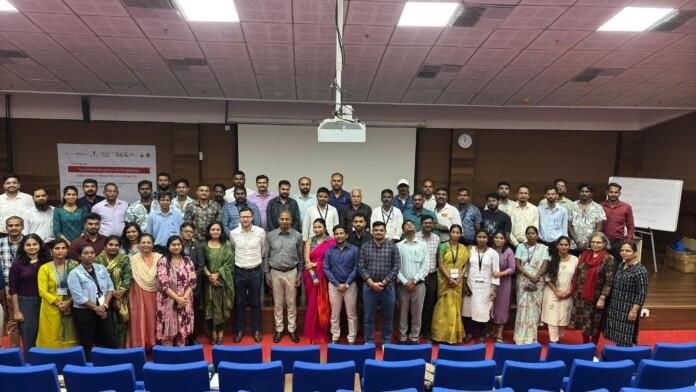(Panaji, November 19, 2024): Imagine Panaji Smart City Development Ltd. (IPSCDL) showcased Panaji’s waste management solutions during the Swachhata Margdarshak Training Programme, which was held on November 18–19, 2024. This initiative was part of a broader effort to empower Urban Local Bodies (ULBs) across Goa and India with the knowledge and tools to drive sustainable waste management.
Organized by the Ministry of Housing and Urban Affairs (MoHUA) in collaboration with GIZ (Deutsche Gesellschaft für Internationale Zusammenarbeit) and the All India Institute of Local Self-Government (AIILSG), the two-day event was hosted at the Goa State Pollution Control Board Auditorium. It brought together key stakeholders, including representatives from Port Blair, Kerala, the State Mission for Clean Ganga, and ULBs across Goa.
Speaking at the event, IPSCDL MD & CEO, Mr. Sanjit Rodrigues said “The Swachhata Margdarshak Programme is a testament to the transformative power of simple innovation and community-driven solutions in urban waste management. At IPSCDL, we would showcase Panaji’s sustainable waste management practices, inspiring change makers to replicate these successes nationwide.”
The Swachhata Margdarshak Programme, a cornerstone of Swachh Bharat Mission 2.0 (SBM 2.0), aims to equip Margdarshaks with the skills and tools needed to lead waste management initiatives in their cities. It addresses the unique challenges of urban waste management, particularly in vulnerable coastal regions, aligning with India’s goal of creating Garbage-Free Cities.
The program featured opening remarks from Mr. Sebastian Markart, Project Director, GIZ. Speaking about the programme’s impact, Sebastian Markart, Project Director of CCPME at GIZ, remarked, “The Swachhata Margdarshak Programme is a testament to the power of collaboration and knowledge-sharing. By bringing together diverse stakeholders, this initiative has provided participants with the tools to drive meaningful change in their communities and strengthen sustainable waste management practices.” Discussions on day 1 emphasized on collaboration, technological innovation and active community involvement as essential drivers of sustainable urban development.
On Day 2, in a presentation, Mr. Sanjit Rodrigues highlighted the integration of regulatory frameworks, community engagement and advanced waste management technologies that are being adopted to achieve the SBM 2.0 goals.
Participants also benefited from on-site experiential visits to Goa’s flagship waste management facilities, including:
- Saligao Integrated Waste Facility , Saligao
- Municipal Market Composting Unit, Panaji
- St. Inez Trash Barrier, Panaji
- Heera Biomethanation Facility, Panaji
These visits provided first-hand insights into waste segregation, composting and biogas production, offering practical models for replication across cities.
Mr. Sebastian Markart, Project Director of CCPME at GIZ, lauded the program’s collaborative approach, stating: “The Swachhata Margdarshak Programme underscores the importance of partnerships in driving meaningful change. It equips Margdarshaks with the tools to revolutionize waste management in their communities.”



